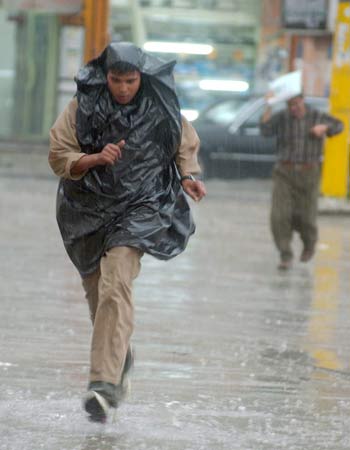
Iraqi man crosses a street under unusually heavy rain that engulfed Baghdad on Sunday (EPA)
BAGHDAD, Iraq, AP -Two car bombs exploded in Baghdad on Monday, killing a bystander and wounding half a dozen others. Gunmen shot down six people, including a child, in a market area of the southern city of Basra, police said.
Also Monday, U.S. Secretary of State Condoleezza Rice and British Foreign Secretary Jack Straw urged Iraqi leaders to form a government as soon as possible to curb the bloodshed and rein in sectarian militias behind much of the violence.
Violence between Shiite and Sunni Muslims has escalated since the Feb. 22 bombing of an important Shiite shrine in Samarra.
In Baghdad’s Dora district, four gunmen charged into a Shiite home late Sunday, lined up a brother, two sisters, and an uncle against a wall and shot them dead, police said.
The father of the family, a grocery shop owner, had been killed six months earlier by gunmen in the same neighborhood, one of Baghdad’s most dangerous. The mother was visiting relatives when the Sunday attack occurred, police said.
The victims of the drive-by shooters in Basra included a navy officer, two policemen, two workers at an electrical plant, and a boy, police said. Basra, Iraq’s second-largest city, is 340 miles southeast of Baghdad.
The car bombings happened early Monday, one in eastern Baghdad’s Sadr City slum, the other in the central district of Karradah, both mostly Shiite areas. The Sadr City explosion killed at least one civilian and wounded four others, and two were wounded in Karradah. The targets were not known, police said.
Bombings in Buhriz damaged several buildings including a barber shop and grocery store in a market district of the town, which is a former Saddam stronghold about 35 miles northeast of Baghdad, police said.
Police discovered two bodies in eastern Baghdad — one in Mashtal that was handcuffed and shot in the head, another in Baladiyat that was strangled and covered with bandages.
In Dora, drive-by shooters killed a police captain outside his home late Sunday, police said.
In northern Iraq, the regional government of Kurdistan released the Kurdish writer Kamal Karim just a week after he received an 18-month sentence for articles on a Kurdish Web site that accused one of the region’s top leaders of corruption, said Mohamed Khoshnaw, a government spokesman.
The prime minister of the Kurdish regional government issued a pardon for Karim, citing international pressure to release the writer.
The visit by Rice and Straw comes at a time of uncertainty over the fate of interim Prime Minister Ibrahim al-Jaafari, the Shiite nominee for a second term but widely blamed for the deadlock in talks on forming a unity government following the Dec. 15 election.
Sunni and Kurdish politicians have called for the Shiite bloc to replace al-Jaafari as its nominee. Last weekend, two prominent Shiite politicians joined calls for the prime minister to step aside — a sign that al-Jaafari’s support is cracking.
Rice and Straw, who arrived Sunday for a surprise, two-day visit, made clear they are frustrated with the slow pace of talks on a new government and said the country needs a strong prime minister as quickly as possible.
During a news conference before departing Monday, both Rice and Straw were careful to avoid specifically calling for al-Jaafari to be shunted aside. But Rice said the next Iraqi prime minister must be a “strong leader” capable of unifying the people of this fractured land.
“We have emphasized, Secretary Rice and myself, time and again that who becomes nominated and elected …including the prime minister is a matter of sovereign decisions by the sovereign parliament,” Straw said.
But he added “somebody has to fill these positions and fill them quickly and we’ve urged those we have been speaking to do so.”
Both Rice and Straw spoke of the need for the next government to curb the power of sectarian militias.
“You have to have the state with a monopoly of power,” Rice said. “We have sent very strong messages” that there must be “a reining in of militias.”
Rice and Straw said they set no deadlines, and there were no immediate signs of progress following the string of meetings the two held Sunday with Iraqi politicians and ethnic and religious power brokers.

Iraqis flash the “V” sign as they stand near the wreckage of a Humvee in the restive city of Ramadi, west of Baghdad (AFP)

Iraqi man crosses street under unusually heavy rain that engulfed Baghdad on Sunday 02 April 2006 (EPA)
